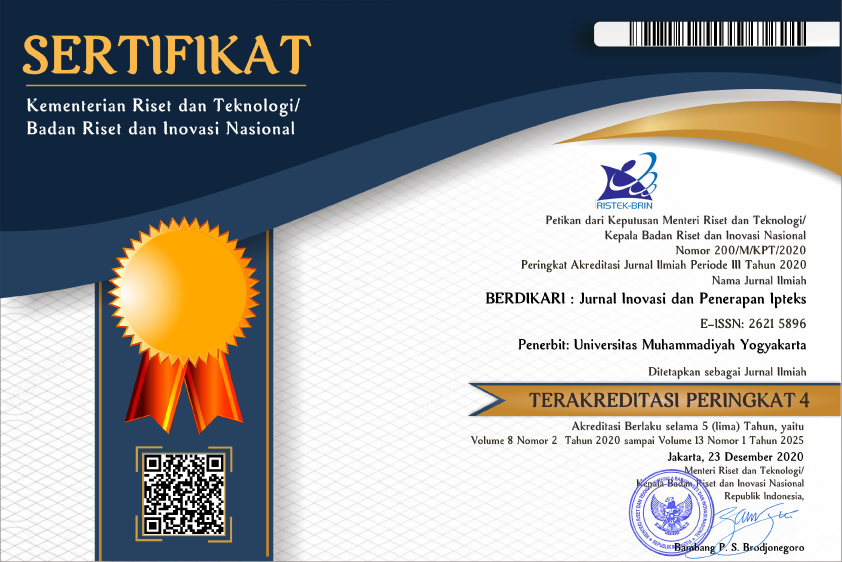Pemilahan Sampah: Satu Tahap Menuju Masyarakat Mandiri Dalam Pengelolaan Sampah
DOI:
https://doi.org/10.18196/bdr.6245Abstract
Addressing the problem of waste management using the principle of Collect-Transport-Dump (Kumpul-Angkut-Buang) is no longer relevant since it does not solve the source of the problem that is the generated waste from household. As the highest waste generator, household waste management is crucial to reduce the waste volume dumped in the landfill. This means that active participation from the community is a must in waste management and for the community to know how to sort the waste and be able to do it is a necessity. The community service discussed in this article is one of the efforts to improve community capacity in Dusun Sruni, Cangkringan Sub-district, Sleman Regency, Yogyakarta in managing the waste generated from their household by adapting the self-managed waste management well implemented in other cities in Indonesia. The steps implemented in the com-munity service as well as the expected results are described in this article. The findings on the potential problems in educating the community-based waste management as well as futher plans activities to the sustainability of the waste management are also discussed in this article.
Keywords: waste management, community participation, community-based waste management
References
Aji, Mukti. (2008). Sistem Pengelolaan Sampah Terpadu. Diakses dari http://mukti-aji.blogspot.co.id/2008/05/sistem-pengelolaan-sampah-terpadu.html, 11 April 2018.
Canadian Council on Learning. (2008). Lessons in Learning: The Benefits of Experiential Learning. Diakses dari http://en.copian.ca/library/research/ccl/ benefits_learning/benefits_learning.pdf, 11 April 2018.
Irawan, Bagus. (2018). Kelola Sampah Mulai Dari Rumah. Opini Tribun Jateng. http:// jateng.tribunnews.com/2018/02/26/opini-kelola-sampah-dimulai-dari-rumah. Diakses 11 April 2018.
Gentry, J. W. (1990). Guide to business gaming and experiential learning. Nichols/GP Pub.
Gotame, Manira. (2012). Community Participation in Solid Waste Management in Kathmandu. A thesis of Department of Geography, University of Bergen, Norway.
Muller, M & Hoffman, L. (2001). Community Partnerships in Integrated Sustainable Waste Management. The Netherlands: WASTE. Diakses dari http://www.waste.nl/sites/waste.nl/ files/product/files/tools_compart.pdf, 11 April 2018
Undang-Undang Republik Indonesia Nomor 18 Tahun 2008 Tentang Pengelolaan Sampah.
Utami, B. D., Indrasti, N. S., & Dharmawan, A. H. (2008). Pengelolaan Sampah Rumahtangga Berbasis Komunitas: Teladan dari Dua Komunitas di Sleman dan Jakarta Selatan. Sodality: Jurnal Transdisiplin Sosiologi, Komunikasi, dan Ekologi Manusia. Hal. 49-68.
http://nasional.republika.co.id/berita/nasional/ daerah/17/03/15/omv2sg319-setiap-hari-indonesia-produksi-sampah-65-juta-ton
https://news.idntimes.com/indonesia/indianamalia/ volume-sampah-2018-diprediksi-mencapai-665-juta-ton-1/full
Downloads
Published
Issue
Section
License
Copyright
Authors retain copyright and grant BERDIKARI Jurnal Inovasi dan Penerapan IPTEK the right of first publication with the work simultaneously licensed under an Attribution 4.0 International (CC BY 4.0) that allows others to remix, adapt and build upon the work with an acknowledgment of the work's authorship and of the initial publication in BERDIKARI Jurnal Inovasi dan Penerapan IPTEK.
Authors are permitted to copy and redistribute the journal's published version of the work (e.g., post it to an institutional repository or publish it in a book), with an acknowledgment of its initial publication in BERDIKARI Jurnal Inovasi dan Penerapan IPTEK
License
Articles published in the BERDIKARI Jurnal Inovasi dan Penerapan IPTEK) are licensed under an Attribution 4.0 International (CC BY 4.0) license. You are free to:
- Share — copy and redistribute the material in any medium or format.
- Adapt — remix, transform, and build upon the material for any purpose, even commercially.
This license is acceptable for Free Cultural Works. The licensor cannot revoke these freedoms as long as you follow the license terms. Under the following terms:
- Attribution — You must give appropriate credit, provide a link to the license, and indicate if changes were made. You may do so in any reasonable manner, but not in any way that suggests the licensor endorses you or your use.
- No additional restrictions — You may not apply legal terms or technological measures that legally restrict others from doing anything the license permits.




